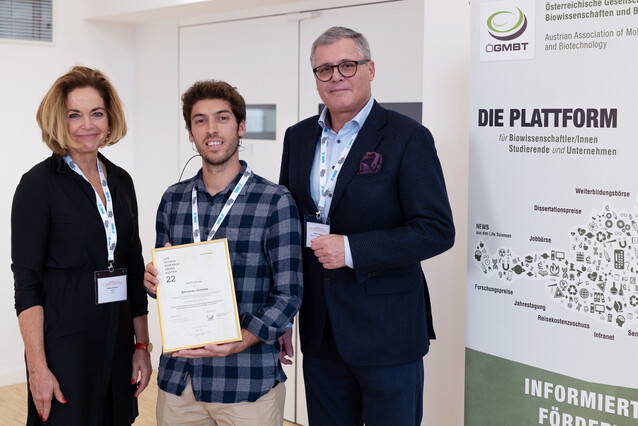Life Science Research Award for Bernardo Almeida

The Austrian Society for Molecular Biosciences and Biotechnology (ÖGMBT) recognises the outstanding work of young scientists with the annual Life Science Research Awards Austria. Bernardo Almeida, PhD student from the lab of Alexander Stark, won the 2022 award in the category ‘basic research’ for his ground-breaking study on enhancer activity.
Yesterday, five young scientists were honoured in Vienna for their exceptional work. The Life Science Research Awards Austria 2022 of the Austrian Society for Molecular Biosciences and Biotechnology (ÖGMBT) went to Bernardo Almeida (IMP), Pia Gattinger (Medical University of Vienna), and Peter Peneder (St. Anna Children's Cancer Research). The prizes, each worth 3,000 euro, were sponsored by the Federal Ministry of Labour and Economic Affairs. Maximilian Schneider (Institute of Molecular Biotechnology of the Austrian Academy of Sciences) and Martin Wilkovitsch (Technical University of Vienna) received the Life Science PhD Award Austria for their doctoral theses.
In his study published in Nature Genetics, Bernardo and his colleagues in the lab of Alexander Stark developed a deep learning algorithm that predicts the activity of enhancers from their DNA sequence. The AI algorithm, called DeepSTARR, proved to be exceptionally accurate in its predictions, thereby helping scientists understand how genes are switched on and off.
“I am very enthusiastic about the deep learning model that Bernardo developed to predict enhancer activities and design enhancers de novo. It’s a decade-long dream of mine come true,” says Alexander Stark. “This award doesn’t only recognise Bernardo’s work, but his collaboration with Fanny Reiter, another PhD student who created the datasets to train the model and ran the experiments to validate it.”
Further reading
Harnessing artificial intelligence to predict and control gene regulation